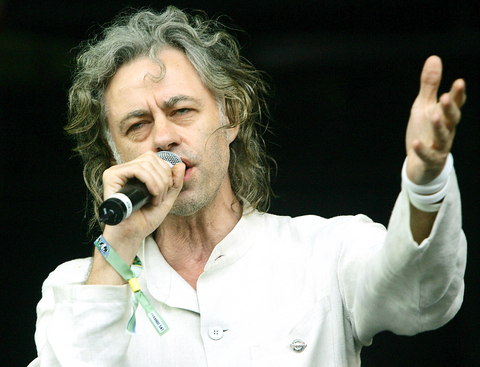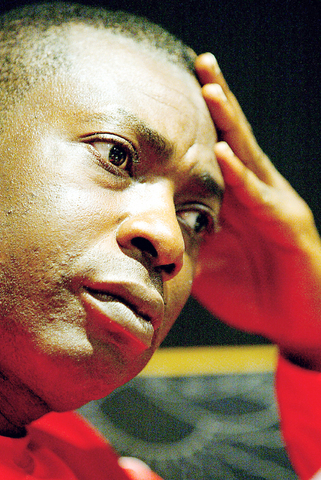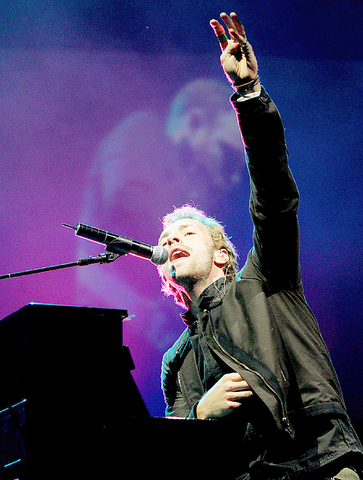Bob Geldof makes an unlikely saint.
The rangy, foul-mouthed Irish rocker who fronted The Boomtown Rats in the 1970s is now far better known as a champion of Africa, haranguer of the powerful and organizer of star-studded charity concerts.
British newspapers once called him "Bob the Gob." Now, with just a touch of irony, he's Saint Bob.

Geldof, 53, was first anointed when he organized the 1984 Band-Aid single and the Live Aid concerts the next year, which raised millions for famine relief in Africa. Twenty years on, he's behind Live 8, a series of concerts around the world designed to press leaders of the rich G8 countries to relieve the burden of impoverished African nations.
Announcing the concerts last month, Geldof said the July 6 to July 8, G8 meeting in Scotland provided a ``unique opportunity for Britain to do something unparalleled in the world ... to tilt the world a little bit on its axis in favor of the poor.''
If Live Aid was about fund-raising, he said, Live 8 is about awareness-raising, ``not for charity but for political justice.''

PHOTOS: AGENCIES
In the early 1980s, Geldof was known as a talented but prickly musician, who took the Rats' name from a song by socialist folk singer Woody Guthrie but boasted that he'd gone into music ``to get famous, to get rich and to get laid.''
Then he saw a television report about famine in Ethiopia and decided he had to act. With Midge Ure of Scottish band Ultravox, Geldof wrote the song Do They Know It's Christmas? and persuaded the era's top British acts -- including Sting, U2, Boy George and Duran Duran -- to perform it under the name Band Aid.
Released before Christmas 1984, the song sold 3 million copies and inspired a US single, We Are the World.

Live Aid -- staged in London and Philadelphia in July 1985 -- raised US$80 million for famine relief and featured performances by Paul McCartney, Queen, U2 and Phil Collins, who crossed the Atlantic by supersonic Concorde to play at both shows.
For Saturday's Live 8 concerts, Geldof once again coaxed and cajoled the cream of the pop world -- including Elton John, Madonna, REM, Coldplay and a reunited Pink Floyd in London; Jay-Z, Maroon 5 and Stevie Wonder in Philadelphia; Dido in Paris and Bjork in Tokyo -- into appearing for free.
With his unruly mane of hair -- once dark, now gray -- and earthily direct manner, Geldof's passion remains strong. Yet he is a contentious figure.
Some on the left have criticized his support for fathers' rights groups and opposition to the European single currency. Many were puzzled when he said US President George W. Bush ``has actually done more than any American president for Africa.''
Nor is Live 8 universally praised. Blur's Damon Albarn criticized the lack of black artists at the shows (An all-African concert featuring musicians including Thomas Mapfumo and Salif Keita was subsequently added at the Eden Project in Cornwall, southwest England).
Others say Live 8's call for G8 leaders to double aid, cancel poor countries' debt and rework unfair trade laws may do more to reward corrupt African governments and salve liberal Western consciences than to relieve poverty.
Oasis songwriter Noel Gallagher -- not performing at Live 8 -- said he was skeptical that ``one of these guys from the G8 is on a quick 15-minute break at Gleneagles and sees Annie Lennox singing Sweet Dreams and thinks, "`She might have a point there, you know?'''
Geldof is reluctant to analyze his motivations. But others have studied his biography, scarred by loss, for clues to his intensely driven personality.
Geldof's mother died of a brain hemorrhage when he was seven. His longtime partner Paula Yates, mother of his three daughters, died of a drug overdose in 1998. Geldof has raised their children, Fifi, Peaches and Pixie, and also adopted Heavenly Hiraani Tiger Lily, Yates' daughter with the late INXS singer Michael Hutchence.
Born in 1951 in an Ireland he recalled as dull and repressive, Geldof soon escaped to a music career -- initially as a rock journalist with Vancouver, Canada alternative weekly The Georgia Straight.
Returning to Ireland in the mid-1970s, he formed The Boomtown Rats, whose reggae-inflected sound and edgy lyrics caught the emerging punk mood. The band scored several British hits -- the snarling Rat Trap knocked John Travolta and Olivia Newton-John off the top of the charts in 1978.
Described by Geldof as ``perennial outsiders, anti-establishment and anti the anti-establishment,'' the band is best known for having its song about a high-school shooting rampage, I Don't Like Mondays, banned by many US radio stations.
By the early 1980s, the Rats' fame was in decline. Geldof continues to produce solo records, but is now far better known as a campaigner. He seems to accept that will be his legacy. His charitable work gained him an honorary knighthood from Queen Elizabeth II in 1986. (Because he is not British, he can't officially call himself by his nickname, Sir Bob.)
Geldof has said he is proud of his musical legacy, but told a reporter in 2003 that he'd been awed to meet people like Paul McCartney and Mick Jagger, ``because they're ... amazing artists and ... well, I'm not.''
On the Net:
Live 8 official site: www.live8live.com
Geldof official site: www.bobgeldof.info

May 11 to May 18 The original Taichung Railway Station was long thought to have been completely razed. Opening on May 15, 1905, the one-story wooden structure soon outgrew its purpose and was replaced in 1917 by a grandiose, Western-style station. During construction on the third-generation station in 2017, workers discovered the service pit for the original station’s locomotive depot. A year later, a small wooden building on site was determined by historians to be the first stationmaster’s office, built around 1908. With these findings, the Taichung Railway Station Cultural Park now boasts that it has

The latest Formosa poll released at the end of last month shows confidence in President William Lai (賴清德) plunged 8.1 percent, while satisfaction with the Lai administration fared worse with a drop of 8.5 percent. Those lacking confidence in Lai jumped by 6 percent and dissatisfaction in his administration spiked up 6.7 percent. Confidence in Lai is still strong at 48.6 percent, compared to 43 percent lacking confidence — but this is his worst result overall since he took office. For the first time, dissatisfaction with his administration surpassed satisfaction, 47.3 to 47.1 percent. Though statistically a tie, for most

As Donald Trump’s executive order in March led to the shuttering of Voice of America (VOA) — the global broadcaster whose roots date back to the fight against Nazi propaganda — he quickly attracted support from figures not used to aligning themselves with any US administration. Trump had ordered the US Agency for Global Media, the federal agency that funds VOA and other groups promoting independent journalism overseas, to be “eliminated to the maximum extent consistent with applicable law.” The decision suddenly halted programming in 49 languages to more than 425 million people. In Moscow, Margarita Simonyan, the hardline editor-in-chief of the

Six weeks before I embarked on a research mission in Kyoto, I was sitting alone at a bar counter in Melbourne. Next to me, a woman was bragging loudly to a friend: She, too, was heading to Kyoto, I quickly discerned. Except her trip was in four months. And she’d just pulled an all-nighter booking restaurant reservations. As I snooped on the conversation, I broke out in a sweat, panicking because I’d yet to secure a single table. Then I remembered: Eating well in Japan is absolutely not something to lose sleep over. It’s true that the best-known institutions book up faster